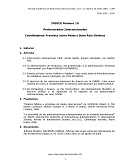Keywords:
Haiti, intervention, violence, peace enforcement, state buildingCopyright (c) 2009 Gastón AÍN

This work is licensed under a Creative Commons Attribution-NonCommercial-NoDerivatives 4.0 International License.
Abstract
When the UN Security Council authorized the military intervention in Haiti and passed a resolution creating a peacekeeping force in the country, it lacked a precise diagnosis on the character of the Haitian state, its history, the essential qualities of the ongoing conflict, as well as the nature of the violence the country was experiencing. This explains why, after almost five years of UN presence in Haiti, recurrent instability and persistent violence are still common features in the Caribbean nation. The kind of intervention and the strategies implemented by the international community to pacify the country were inappropriate and they proved to be ineffective in tackling cases such as the Haitian one. The peace enforcement mission deployed to the country used military deterrence to contain external manifestations of the violence, thereby “freezing” the conflict and pursuing the organization of massive and transparent elections that were held on 6 February 2006. However, the present and historical causes provoking and reproducing the violence in Haiti violence are still in place. Democracy cannot thrive in the absence of a state structure able to guarantee a political order with a minimum of institutional development, particularly, when “disorder” has become the preferred political tool for some local actors in order to maintain the status quo. The benefits of a normalized institutional life, in a context of state absence, are not sustainable for the long term.





